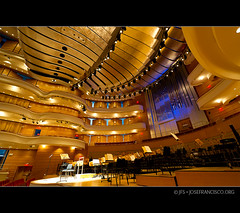Pacific Symphony Welcomes Argentina's World-Renowned Concert Organist, Hector Olivera, to Showcase the William J. Gillespie Concert Organ
 Power, passion and melodious music fill the concert hall when dynamic virtuoso Hector Olivera performs the final organ recital of Pacific Symphony’s 2011-12 “Pedals and Pipes” series showcasing the majestic 4,322-piped William J. Gillespie Concert Organ. The Times Reporter describes an evening with Olivera as: “An event, a happening, a joyful celebration of the sheer power and pressure that a true virtuoso like Hector Olivera can unleash in a concert hall.” Born in Buenos Aires, Olivera began playing the pipe organ at age 3, and at age 5 played for the legendary Eva Perón. Since attending The Juilliard School of Music, his passionate and personal interpretations of both classical and popular music have earned him standing ovations around the world. Taking full advantage of the organ’s versatility, Olivera performs works by Bach, Clarke/Purcell, Franck, Liszt, a little improvisation and more for a one-night-only concert, Sunday, March 11, at 7 p.m. in the Renée and Henry Segerstrom Concert Hall. Tickets are $15-59; for more information or to purchase tickets, call (714) 755-5799 or visit www.PacificSymphony.org.
Power, passion and melodious music fill the concert hall when dynamic virtuoso Hector Olivera performs the final organ recital of Pacific Symphony’s 2011-12 “Pedals and Pipes” series showcasing the majestic 4,322-piped William J. Gillespie Concert Organ. The Times Reporter describes an evening with Olivera as: “An event, a happening, a joyful celebration of the sheer power and pressure that a true virtuoso like Hector Olivera can unleash in a concert hall.” Born in Buenos Aires, Olivera began playing the pipe organ at age 3, and at age 5 played for the legendary Eva Perón. Since attending The Juilliard School of Music, his passionate and personal interpretations of both classical and popular music have earned him standing ovations around the world. Taking full advantage of the organ’s versatility, Olivera performs works by Bach, Clarke/Purcell, Franck, Liszt, a little improvisation and more for a one-night-only concert, Sunday, March 11, at 7 p.m. in the Renée and Henry Segerstrom Concert Hall. Tickets are $15-59; for more information or to purchase tickets, call (714) 755-5799 or visit www.PacificSymphony.org.“Olivera swept the audience with absolute Olympic virtuosity, and that still doesn’t say it… Hector Olivera is in a class by himself,” wrote the Atlanta Journal Constitution after a solo performance he gave in celebration of the 1996 Atlanta Olympic Games.
“Here is a man with phenomenal technique and musicianship who moves from one genre to another with ease… He continues to grow, evolve, and entertain; he envisions himself as a total orchestra.”—The American Organist.
To begin the recital, Olivera unleashes the lush composition and dramatic intensity of Meyerbeer’s Coronation March from “The Prophet,” a moment of high
operatic spectacle. Then, the mood shifts to the poetic and gentle interlacing of melodies by Bach in his Choral Prelude from Cantata, BWV 147, “Jesu, Joy of Man’s Desiring,” originally written for four-part chorus and small instrumental ensemble. The joyous and festive celebration of Clarke/Purcell’s Trumpet Tune, Air and Voluntary in D precedes Franck’s Prelude, Fugue and Variation, and French prodigy Daquin’s Noël No. 8 delights in its Galant style. Finishing up the first half is Bach’s Prelude and Fugue in E-flat major, BWV 552, called “one of the most noble and eloquent utterances among [Bach’s] many organ compositions,” by music historian Michael Jameson.
After intermission, Liszt takes Bach’s name and turns it into a Fantasy and Fugue, and Bossi’s version of the familiar hymn Ave Maria comes alive through the organ’s many voices. Olivera concludes the concert by improvising on a submitted theme.
One of today’s most sought-after concert organists, Olivera has performed at Carnegie Hall in New York, Royal Albert Hall in London, Cathedral of Notre Dame in Paris, Walt Disney Concert Hall, and around the world in Australia, Germany, Holland, Italy, Japan, Belgium and more. A child prodigy, he entered the Buenos Aires Conservatory at age 6 and at age 12 was the youngest student to attend the University of Buenos Aires. In 2000, he performed a solo memorial concert in New York City’s St. Paul the Apostle as a tribute to his hero and role model, organist Virgil Fox and a subsequent memorial concert at Grace Cathedral in San Francisco in 2004.
The co-star of the evening is the 30-ton, four-stories tall, $3.1 million William J. Gillespie Concert Organ built from steel, tin, oak, poplar, maple, lead and carbon fiber. The organ premiered at the first concert of Pacific Symphony’s 2008-09 season, after three years and 42,000 hours of direct labor by a team at organ builder, C.B. Fisk. This concert is generously sponsored by Valerie and Barry Hon.

Comments